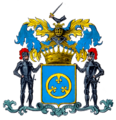Wlodimir Ledóchowski facts for kids
Quick facts for kids Włodzimierz Halka Ledóchowski SJ |
|
|---|---|
| 26th Superior General of the Society of Jesus | |
|
.
Włodzimierz Ledóchowski SJ
|
|
| Enthroned | 11 February 1915 |
| Reign ended | 13 December 1942 |
| Predecessor | Franz Xavier Wernz |
| Successor | Jean-Baptiste Janssens |
| Personal details | |
| Birth name | Włodzimierz Halka Ledóchowski |
| Born | 7 October 1866 Loosdorf, Austria-Hungary |
| Died | 13 December 1942 (aged 76) Rome, Italy |
| Buried | Campo Verano, Rome |
| Nationality | Polish |
| Denomination | Roman Catholic |
| Parents | Count Antoni Halka Ledóchowski, Countess Joséphine Salis-Zizers |
| Alma mater | Theresianum, Jagiellonian University, Gregorianum |
| Coat of arms |  |
Włodzimierz Halka Ledóchowski (born October 7, 1866 – died December 13, 1942) was a important Polish Catholic priest. He led the Society of Jesus (also known as the Jesuits) as their 26th Superior General. He held this role from 1915 until his death in 1942. Before becoming a priest, he worked briefly as a page in the royal court of the Habsburg monarchy.
Contents
Becoming a Leader: Early Life and Education
Włodzimierz Ledóchowski was born in Loosdorf, Austria. He was one of nine children. His father was Count Antoni Halka Ledóchowski, and his mother was Countess Joséphine Salis-Zizers. His family had strong ties to the Church. His uncle was Cardinal Mieczysław Halka-Ledóchowski. Two of his sisters also became religious figures. They are known as Saint Maria Ursula of Jesus and Blessed Maria Teresa Ledóchowska. His brother, Ignacy Kazimierz Ledóchowski, was a General in the Polish Army.
Włodzimierz first studied at the Theresianum in Vienna. For a short time, he was a page for Empress Elizabeth. Later, he studied Law at the Jagiellonian University in Kraków. He then decided to become a priest. While studying at the Gregorian University in Rome, he joined the Jesuit order in 1889. He became a priest five years later.
After his ordination, he started writing. However, he soon became a leader within the Jesuits. He was made Superior of the Jesuit house in Kraków. Then he became the Rector (head) of the College there. In 1901, he became the Polish Vice-Provincial. A year later, he was the Provincial of Southern Poland. From 1906 until 1915, he worked as an assistant in the German province of the Jesuits.
Leading the Jesuits: A Time of Change
In 1915, at 49 years old, Ledóchowski was chosen to lead the entire Jesuit order. He became the 26th Superior General on February 11, 1915. He was elected on the second vote.
His time as leader was very challenging. The world faced the First World War, the Great Depression, and the Second World War. Despite these huge problems, the number of Jesuits actually grew during his leadership. He called two important meetings (General Congregations). One was to help the Jesuits understand new Church laws. The other was to choose an assistant for him as he got older.
He also helped create new important institutions. These included the Pontifical Oriental Institute and the Pontifical Russian College. He also helped establish the Institutum Biblicum at the Gregorian University. He worked to get property back for the Jesuits after an agreement between the Church and the Italian government. This allowed the Jesuits to build new buildings for the Gregorian University and their main headquarters (Curia Generalis) in Rome. This agreement helped the Society of Jesus grow in influence and reputation.
Standing Against Injustice: The Nazi Era
During the rise of Nazi Germany, Ledóchowski became very concerned about their actions. He understood Adolf Hitler's dangerous plans. He even predicted the agreement between Hitler and Stalin.
Ledóchowski used the Vatican Radio, which was run by the Jesuits, to speak out. He broadcasted strong condemnations of the Nazi crimes in Poland. This led to protests from the German government. He also supported secret resistance movements in parts of Europe that the Nazis had taken over. The Nazis were especially harsh on the Catholic Church in Poland. Ledóchowski helped the Jesuits stand firmly against the Nazis. He also helped Vatican Radio speak out against Nazi oppression, especially concerning Poland.
Later Years and Legacy
Włodzimierz Ledóchowski passed away in Rome on December 13, 1942, at the age of 76. His funeral was held in the Church of the Gesù. His body was then buried in the Jesuit burial ground at Campo Verano in Rome.
Many people respected his leadership. Nicholas Murray Butler, who met Ledóchowski in 1930, later said that he was considered "one of the two or three greatest heads of the Jesuit Order."
See also
- Ledóchowski, a look at the Ledóchowski family
- Ursula Ledóchowska, Włodzimierz Ledóchowski's sister who became a saint
- Maria Teresia Ledóchowska, Włodzimierz Ledóchowski's sister who was declared blessed
Images for kids
 | Selma Burke |
 | Pauline Powell Burns |
 | Frederick J. Brown |
 | Robert Blackburn |


